Articles by Ajai Chari, MD
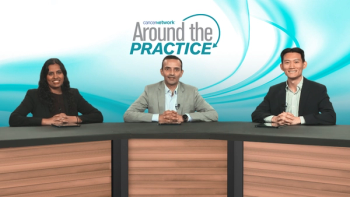
Panelists discuss how, when considering earlier lines of CAR T-cell therapy for relapsed/refractory multiple myeloma, key institutional factors include patient fitness/age, cytogenetic risk status, prior therapy response duration, and BCMA expression levels. Manufacturing timelines, financial considerations, and center-specific outcomes data also influence timing decisions. For patients receiving early-line CAR T therapy, subsequent treatment options typically focus on novel agent combinations or clinical trials exploring additional cellular therapies, with choices guided by response duration to CAR T and the patient’s individual disease characteristics and treatment goals.

Panelists discuss how, for second-line treatment of relapsed/refractory multiple myeloma (R/R MM), patients suitable for CAR T-cell (cilta-cel vs ide-cel) therapy typically have a poor prognosis with limited response to prior therapies. Institutional guidelines focus on factors such as prior lines of therapy, organ function, and cytogenetics. Non-medical factors, such as geographic access and financial constraints, also influence CAR T-cell therapy referral eligibility.
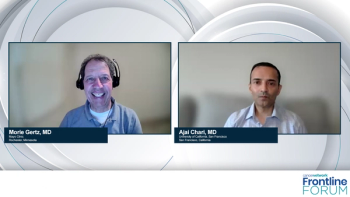
Panelists discuss how chimeric antigen receptor (CAR) T-cell therapy in early relapsed multiple myeloma can provide deep and durable responses for eligible patients, though patient selection, timing of referral, manufacturing logistics, and management of adverse effects remain important considerations in optimizing outcomes.
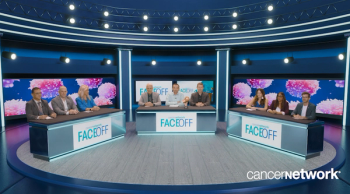
Clinical Scenario: Implementation of Bispecific Therapy for Relapsed Refractory Multiple Myeloma in a Community Center
ByAjai Chari, MD,Thomas G. Martin, MD,Jens Hillengass, MD, PhD ,Beth Faiman PhD, MSN, APN-BC,BMTCN, AOCN, FAAN, FAPO ,Louis Williams, MD,Shebli Atrash, MD ,Donna Catamero, ANP-BC, OCN, CCRC,Cesar Rodriguez Valdes, MD ,Shambavi Richard, MD Panelists discuss how community centers can effectively implement bispecific antibody therapy for patients with relapsed/refractory multiple myeloma, addressing challenges such as staff training, patient monitoring, and managing potential adverse events in a non-academic setting.

Panelists discuss how the CEPHEUS trial’s demonstration of improved progression-free survival with daratumumab-VRd versus VRd alone in transplant not-preferred NDMM provides compelling evidence for quadruplet therapy in this setting, though considerations of cost, toxicity management, and patient selection remain important factors in implementation.

Clinical Scenario: A 58-Year Old Woman with Relapsed Refractory Mutiple Myeloma, post-ASCT, MRD-negative, on Bispecific Therapy
ByAjai Chari, MD,Thomas G. Martin, MD,Jens Hillengass, MD, PhD ,Beth Faiman PhD, MSN, APN-BC,BMTCN, AOCN, FAAN, FAPO ,Louis Williams, MD,Shebli Atrash, MD ,Donna Catamero, ANP-BC, OCN, CCRC,Cesar Rodriguez Valdes, MD ,Shambavi Richard, MD Panelists discuss how to approach treatment decisions and management strategies for a 58-year-old woman with relapsed/refractory multiple myeloma who is post-autologous stem cell transplant, MRD-negative, and currently receiving bispecific antibody therapy, considering factors such as prior treatments, response duration, and long-term treatment goals.

Dosing Interval and Considerations for Bispecifics Combination in Relapsed Refractory Multiple Myeloma
ByAjai Chari, MD,Thomas G. Martin, MD,Jens Hillengass, MD, PhD ,Beth Faiman PhD, MSN, APN-BC,BMTCN, AOCN, FAAN, FAPO ,Louis Williams, MD,Shebli Atrash, MD ,Donna Catamero, ANP-BC, OCN, CCRC,Cesar Rodriguez Valdes, MD ,Shambavi Richard, MD Panelists discuss how optimizing dosing intervals and carefully considering combination strategies for bispecific antibodies in relapsed/refractory multiple myeloma could enhance treatment efficacy while managing toxicities and improving patient quality of life.

Panelists discuss how recent clinical trials have demonstrated improved outcomes with antibody-containing regimens and biomarker-driven approaches in patients with transplant not-preferred newly diagnosed multiple myeloma (NDMM).

Sequencing Therapies in Relapsed Refractory Multiple Myeloma: Bispecifics and CAR T-Cell Therapies
ByAjai Chari, MD,Thomas G. Martin, MD,Jens Hillengass, MD, PhD ,Beth Faiman PhD, MSN, APN-BC,BMTCN, AOCN, FAAN, FAPO ,Louis Williams, MD,Shebli Atrash, MD ,Donna Catamero, ANP-BC, OCN, CCRC,Cesar Rodriguez Valdes, MD ,Shambavi Richard, MD Panelists discuss how the optimal sequencing of bispecific antibodies and CAR T-cell therapies in relapsed/refractory multiple myeloma could maximize treatment efficacy and improve patient outcomes in this challenging disease setting.

OPTec: Outpatient Step Up Administration of Teclistamab: Implications in Real-World Practice
ByAjai Chari, MD,Thomas G. Martin, MD,Jens Hillengass, MD, PhD ,Beth Faiman PhD, MSN, APN-BC,BMTCN, AOCN, FAAN, FAPO ,Louis Williams, MD,Shebli Atrash, MD ,Donna Catamero, ANP-BC, OCN, CCRC,Cesar Rodriguez Valdes, MD ,Shambavi Richard, MD Panelists discuss how the OPTec study, which explores outpatient step-up administration of teclistamab, could impact real-world practice by potentially improving patient convenience and reducing healthcare resource utilization in the treatment of multiple myeloma.

Panelists discuss how the decision between quadruplet versus triplet therapy depends on multiple factors, including cytogenetic risk status, insurance coverage/drug access, patient fitness to tolerate additional toxicity, and the strength of evidence supporting improved outcomes with 4-drug combinations.

Prophylactic Tocilizumab in MajesTEC-1 for the Reduction of CRS
ByAjai Chari, MD,Thomas G. Martin, MD,Jens Hillengass, MD, PhD ,Beth Faiman PhD, MSN, APN-BC,BMTCN, AOCN, FAAN, FAPO ,Louis Williams, MD,Shebli Atrash, MD ,Donna Catamero, ANP-BC, OCN, CCRC,Cesar Rodriguez Valdes, MD ,Shambavi Richard, MD Panelists discuss how prophylactic use of tocilizumab in the MajesTEC-1 trial may reduce the incidence and severity of cytokine release syndrome (CRS) in patients receiving bispecific antibody therapy for multiple myeloma, potentially improving treatment safety and tolerability.

Bispecific Antibody Combinations In Relapsed Refractory Multiple Myeloma: RedirecTT-1 Follow-Up
ByAjai Chari, MD,Thomas G. Martin, MD,Jens Hillengass, MD, PhD ,Beth Faiman PhD, MSN, APN-BC,BMTCN, AOCN, FAAN, FAPO ,Louis Williams, MD,Shebli Atrash, MD ,Donna Catamero, ANP-BC, OCN, CCRC,Cesar Rodriguez Valdes, MD ,Shambavi Richard, MD Panelists discuss how the follow-up results from the RedirecTT-1 study provide insights into the long-term efficacy and safety of bispecific antibody combinations in treating relapsed/refractory multiple myeloma, potentially shaping future treatment approaches for this challenging disease.

Panelists discuss how patient-specific factors like age, comorbidities, cytogenetic risk status, and personal preferences guide decisions to deviate from standard protocols, with particular attention to frailty scores and organ function when considering treatment intensity.

Bispecific Antibody Combinations In Relapsed Refractory Multiple Myeloma: TRIMM-2 Study
ByAjai Chari, MD,Thomas G. Martin, MD,Jens Hillengass, MD, PhD ,Beth Faiman PhD, MSN, APN-BC,BMTCN, AOCN, FAAN, FAPO ,Louis Williams, MD,Shebli Atrash, MD ,Donna Catamero, ANP-BC, OCN, CCRC,Cesar Rodriguez Valdes, MD ,Shambavi Richard, MD Panelists discuss how the TRIMM-2 study explores the potential of combining bispecific antibodies to enhance treatment efficacy in patients with relapsed/refractory multiple myeloma, potentially offering a novel therapeutic strategy for this difficult-to-treat condition.

Talquetamab, a GPRC5DxCD3 bispecific antibody (BsAb), for Relapsed Refractory Multiple Myeloma: MonumenTAL-1 Data and Implications
ByAjai Chari, MD,Thomas G. Martin, MD,Jens Hillengass, MD, PhD ,Beth Faiman PhD, MSN, APN-BC,BMTCN, AOCN, FAAN, FAPO ,Louis Williams, MD,Shebli Atrash, MD ,Donna Catamero, ANP-BC, OCN, CCRC,Cesar Rodriguez Valdes, MD ,Shambavi Richard, MD Panelists discuss how Talquetamab, a novel GPRC5DxCD3 bispecific antibody, shows promising results in treating relapsed/refractory multiple myeloma based on the MonumenTAL-1 trial data, potentially offering a new therapeutic option for this challenging patient population.

Panelists discuss how VRd (bortezomib, lenalidomide, dexamethasone) remains the standard frontline regimen for transplant-eligible newly diagnosed multiple myeloma (NDMM) patients, though some now consider adding daratumumab (dara-VRd) in high-risk cases.
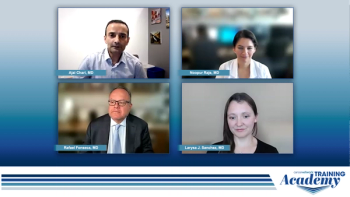
Noopur Raje, MD, discusses the role of T-cell affinity in bispecific therapy for patients with relapsed/refractory multiple myeloma and how it impacts treatment practices.

The panel discusses the benefits of having multiple BCMA-targeting bispecifics available for patients with relapsed/refractory multiple myeloma.

Rafael Fonseca, MD, discusses the role of bispecifics in relapsed/refractory multiple myeloma and the implications of incorporating them into combination regimens.

Noopur Raje, MD, reviews clinical research on elranatamab combination therapy in patients with relapsed/refractory multiple myeloma.

Focusing on clinical trials evaluating combination strategies with bispecifics, Larysa J. Sanchez, MD, discusses the TRIMM-2, TRIMM-3, and MajesTEC-3 studies.

Rafael Fonseca, MD, discusses the MonumenTAL-2 and MonumenTAL-3 clinical trials investigating talquetamab combination strategies in relapsed/refractory multiple myeloma.

Hematologist-oncologists discuss GPRC5D-targeting treatments that are currently in development for patients with relapsed/refractory multiple myeloma.

Noopur Raje, MD, shares clinical perspectives on her experience treating patients with prior BCMA bispecific exposure and provides insights on adverse event management practices in patients receiving talquetamab.

Larysa J. Sanchez, MD, discusses recent efficacy data presented at EHA 2024 from the long-term follow-up results of the phase 1/2 MonumenTAL-1 study investigating talquetamab in relapsed/refractory multiple myeloma.

A panel of experts on multiple myeloma discuss the importance of GPRC5D as a target of interest in relapsed/refractory disease and discuss their experiences with talquetamab in clinical practice.
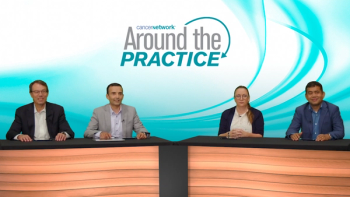
The expert panel closes the discussion with key takeaways on the relapsed/refractory multiple myeloma treatment landscape.

Multiple myeloma–treating oncologists provide comprehensive insights on deciding between bispecific antibody monotherapy, combination therapy, and CAR T-cell therapy.

The panel continues their discussion on adverse effect management with a focus on GPRC5D-targeting bispecific antibodies in multiple myeloma.






